TWH – Today marks the 17th annual Transgender Day of Remembrance. Around the world, organizations and individuals will be hosting events, memorials, and vigils to remember those who have been lost due to transgender-related violence. It is a powerful day – one that is part of a larger month-long transgender awareness campaign.
Held every Nov. 20, Transgender Day of Remembrance (TDoR) marks the death of Rita Hester, who was murdered in her Boston apartment in 1998. The case still remains unsolved to this day. However, a year after her death writer, Gwendolyn Ann Smith held a vigil in San Francisco to honor Hester’s life and to bring awareness to the issues faced by transgender people. The 1999 vigil became the very first Transgender Day of Remembrance. Shortly after, other awareness campaigns and movements were launched, including the website, “Remembering Our Dead.”
Seventeen years later, the movement has grown. Throughout November, activities are held, culminating in the Day of Remembrance. The TDoR campaign’s main site hosts a list of not only the worldwide activities, but also the names of people who have died as a result of transgender-related violence over the past year.
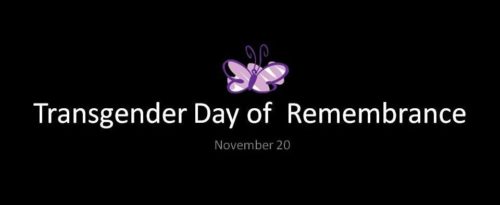
For TDoR 2016, Wisconsin-based Circle Sanctuary decided to expand its own regular annual memorial observances. Rev. Selena Fox said, “It is important to stand in solidarity with our transgender community members. With transphobia and hate crimes on the rise, it is important that we draw attention to this issue that impacts many in our community and to create a safe and supportive place to share concerns, experiences, perspectives, and support.”
Fox said that Circle has had trans* members since its inception in 1974, and the organization has always worked toward supporting the trans* community’s quest for equality. Four years ago, Rev. Fox began hosting a formal memorial ritual to honor TDoR. This year, that event, which is being facilitated by members Brianne Burne, Jake Bradley, and Nate Metrick, has been expanded to include a candle lighting memorial in the temple room, followed by a sharing circle.
Rev. Fox added, “We recognize that the Divine takes many forms, and that there are many forms of gender expression, all of which are sacred. It is our hope that events like ours will help build a better world where the divinity within each person is honored, and where no one feels afraid due to their gender identity.”
For the 2016 TDoR Wild Hunt forum, we reached out to the coordinators of Circle’s new event, asking them tell us more about living transgender, what this specific day means to them, and how these observance event can help the greater cause. We spoke with Brianne Burke, known as Brianne Raven Wolf or simply Bree. She is a 73-year old gender-fluid trans*woman, who is a member of Circle Sanctuary and a practicing eclectic Witch.
Bree is joined by Jake Bradley, a certified naturalist, death midwife, and doula. Bradley has provided ministry for over 25 years, and designs and manages harm-reduction outreach and shelter programming for people experiencing homelessness. Bradley founded and helped manage the first trans-safe youth shelter in Chicago, and provide training and consultation on LGBTQ competence, trauma-informed care, harm reduction, crisis management, and other topics through their business, Elements Consulting.
In addition to the two Circle event coordinators, we also spoke with activist and minister Katharine A. Luck, who participated in last year’s TDoR forum. Rev. Luck is a transgender woman of mixed racial heritage living in Florida. She is a Neo-Hellenic priestess, minster of Fire Dance Church of Wicca and transgender activist. In 2013, Luck organized the first Transgender Day of Remembrance vigil in Pensacola. The following year, she setup the transgender advocacy group STRIVE of which she is currently the President.
We welcome our contributors, and thank them for taking the time to speak with us.
The first question asked was whether our interviewees have seen or felt any noticeable change in awareness in the mainstream public’s understanding of transgender issues. If there was a change, has that change been positive?
Jake Bradley: The last few years have been an interesting and exciting moment in public consciousness around trans* issues. Between the emergence of some transgender pop culture figures and wider-spread efforts of education and advocacy, it seems that the “average American” is more aware of the existence of trans* people than before, and dialogue about the needs and perspectives of trans* people is much more commonplace. I am especially grateful for Laverne Cox and celebrities like her who highlight the particular struggles and triumphs of trans* people of color and who speak out in issues that others in the LGBTQ community have often ignored, such as incarceration and homelessness.
While we still see misguided transphobic rhetoric about the dangers of inclusion and respect for trans* people, and plenty of deference to the comfort levels of cisgender people over the dire safety needs of trans* people, it’s heartening to see more and more public figures and organizations affirming inclusion. For example, as ugly and hurtful as the “bathroom bill” policies have been, we now are in a moment in history where many businesses and public figures are willing to … rebuke and boycott the jurisdictions where hate and ignorance are currently winning the day. In more subtle ways, we see less common exploitation and ridicule of trans* people in mainstream media, and several media outlets are making a real effort to use people’s correct names and pronouns, and to educate the public on acceptable terminology, etc.
Schools and other organizations are more frequently realizing they need to educate and skill-build with their faculty and staff. Trans* kids in many places are being given more access to competent and sensitive medical care. Support groups and alliances are more numerous and accessible. There have been some important changes in government policy under the Obama tenure that have led to greater education and non-discrimination practices, and I’m hopeful we will manage to protect these as we move forward into the next administration. We have a very long way to go, but we seem to be headed in the right direction!
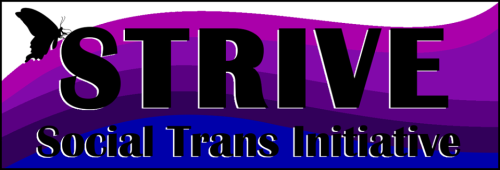
Brianne Burne: I think there has been a noticeable change from what it was a few years ago. I’m involved in quite a few groups, locally and nationally. Around Madison [Wisconsin], I belong to the Madison Area Transgender Association and also LGBT OutReach-Madison. We have quite a few trans* activists here, and the growth has really been coming from social media in my opinion.
Katharine A. Luck: Prior to the recent “bathroom bill,” such as the now infamous HB2 in North Carolina, we were largely ignored by legislation, and we have not suddenly started using public restrooms in the last two years. Instead, as trans* people have become more visible, a side effect of visibility is transphobic legislation from people who think our existence began with their awareness of it.
For the next question, we asked what the biggest threat to the community’s safety was. This is a difficult question, but we asked our interviewees, if they could wave a wand to change one thing that would make the biggest impact, what would that one thing be?
JB: This is a difficult question. Trans* and GNC (gender non-conforming) people are at astronomically disproportionate risk for homelessness, unemployment or underemployment, depression and suicide, being physically and sexually assaulted, negative interactions with police, incarceration, and many other challenges and harms, which are all consequences of cisnormativity and transphobia.
It would be easy to say that ignorance and transphobia are the biggest threat. The fact that police often fail to protect and respect trans* folks, and even frequently brutalize us with impunity, makes the everyday safety of trans* people a thing never to take for granted. Still, there are gradations from relative safety to extreme risk inside the community of trans* and GNC people based on other identity and socioeconomic factors.
Race (and racism) is probably the biggest cause of disenfranchisement of the most vulnerable trans* people from competent medical and mental health care, adequate employment, safe housing, and fair treatment by law enforcement. Institutional racism and white supremacy cause so much more harm to trans* people of color, and especially to black and brown trans women, and also cause division within the LGBTQ community, so that young trans* people of color often don’t benefit from allyship on the part of more affluent or empowered LGBTQ people, nor have their safety and quality of life as positively impacted by gains from LGBTQ activism. My magick wand would eradicate white supremacy and dismantle racism. Then, the most at-risk trans* people would benefit, along with people of color of all genders in this nation.
BB: The biggest threat to the community’s safety may well be the new incoming Republican administration given the far right evangelical Christian attitudes of the VP-elect and others in some state and federal governmental positions. Especially in the southern states, such as North Carolina and Mississippi. The one thing that could make an impact: if people everywhere would realize we are all human beings and, even though the trans* community is different, […] we aren’t a threat to anybody.
KL: This country just elected one of the most outspoken enemies of the LGBTQ community to the office of vice president. Our new president-elect is, frankly, a thinly veiled neo-Nazi, having surrounded himself with champions of white supremacy, like Steve Bannon, and has run on a platform of racial fear, hatred, and proposed separatism. Our vice president-elect Mike Pence has specifically targeted the LGBTQ community. He was responsible for Indiana’s anti-LGBTQ legislation and believes LGBTQ people can be “cured” through conversion therapy. He even tried to divert funds from HIV programs to conversion therapy. While its modern incarnation might not include shock treatment, conversion therapy increases suicides, nonetheless.
At present, I can say without reservation that the greatest threat to the transgender community, LGBTQ people, and likely all marginalized people, is the new administration which will begin in January.
![Circle Sanctuary TDoR "Green Face" altar [Courtesy Photo]](https://wildhunt.org/wp-content/uploads/2016/11/Transgender-Day-of-Remembrance-1-e1479606984783-500x366.jpg)
Circle Sanctuary TDoR “Green Face” altar [Courtesy Photo]
JB: Here is a handout we made a while ago called “Top 10 Ways to be a Trans* Ally.”
BB: To elevate the barriers. People need to get educated about trans* people through community programs. I am starting to see this in a lot of public schools with programs like GSAFE and adult programs such as PFLAG. We need to eliminate the “fear” that cisgender people have about us.
KL: I consider intersectionality and solidarity to be the key to equality. Every person of conscience in this country and the world must resist the oppression of all people. Trans* people exist in every demographic, and I will do all in my power to advocate for all of them. I ask that everyone else do the same.
For our fourth question, we asked what the Pagan, Heathen and polytheist communities could do better in support of their transgender members.
JB: Neopaganism was perhaps founded in part in reaction against patriarchal religious systems that emphasized masculine personifications of the Divine, and Paganism has been revolutionary in its promotion of the Divine as feminine and also as a “balance” or “marriage” of both feminine and masculine. Paganism has made revolutionary contributions to the world in terms of celebrating embodiment, in promoting some feminist ideals, and in sex-positivity. However, for those of us who don’t see our gender as the most essential aspect of our identity, or for whom our gender is not rooted in anatomy or gendered biological life cycles, or for whom binary gendered paradigms don’t fit, there’s still plenty of opportunity for alienation.
Gender constructions are so rampant in most Pagan practice, and are present in so many standard rites of passage. I think lots of Pagan communities (like many in dominant U.S. culture), could become safer for their trans* members by recognizing and celebrating that there isn’t just one way to be a woman or to be a man, that gender doesn’t have to be based on biology, that “maleness” and “femaleness” aren’t mutually exclusive, and that lots of us don’t fit in that binary system in any case. I think that Pagan communities would also find that cisgender members would benefit from the increased freedom and room that recognizing and celebrating gender diversity can offer anyone.
I appreciate the step many groups have made of affirming people’s self-identity rather than projecting gender onto people or having some other qualifying “test” or eligibility criteria for one of the binary identities. The next step might be to question whether rites of passage need to be attached to biological events and gender-based social roles, and to begin to ask people what things are meaningful to them in their passage through life and what symbols there are of these passages, etc., and to begin to develop some non-gender-based rites that affirm the things that are most meaningful to people as they pass through stages of life.
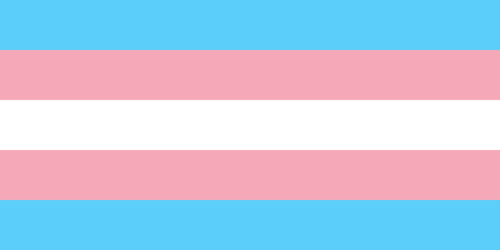
JB (continued): What are the things all of us have in common as we age, regardless of gender or biology? Teenagers are teenagers. Parents are parents. Many of us, if we are lucky to live long enough, have a part of our lives where maybe we work for a living less, and our bodies start to be less sturdy and reliable in ways we might have previously taken for granted. I’m not advocating that cisgender men and women shouldn’t have opportunities to celebrate their embodiment, but just that there be more spaces where gender (and binary-gendered bodies and biological cycles) isn’t the primary aspect of our humanity, and that there be more spaces where diversity of gender identity, expression, experience, role, etc., are embraced more. Finally, I just want to say that I am so deeply grateful for Selena Fox’s leadership and legacy for LGBTQ inclusion throughout her life, and for the efforts made by Circle Sanctuary to embrace and support gender minorities.
BB: I think the Pagan community is, from what I’ve been involved in, doing a very good job supporting trans* people. I’ve never had a problem with anybody in the Pagan community not making me feel welcome, accepted, and loved.
KL: As Pagans we must diminish the focus on binary gender and become more inclusive. We must have roles in both our society and our practice which can be occupied by anyone, of any gender. If necessary we must be willing to create new roles to suit the needs of the members of our community. We must remember tradition, but we must be willing to adapt. The trans* community has always had a role to play in both pagan religion and witchcraft, and always will.
Next, we asked for words of hope. Often when talking about silenced populations, we focus on the struggle. So, we asked our interviewees to take a moment to share something beautiful about the transgender community or about being transgender: a story or even a moment?
JB: Oh, wow! Thank you for this question! Spaces where gender variance is the norm and where lots of folks under the trans* umbrella are present can be the most beautiful and amazing spaces! There is so much more room for everyone to be whoever they are, in whatever collection of attributes and expressions they come up with! Trans* people tend to be phenomenally resilient, adaptive, and creative about making family and community across all kinds of difference!
BB: Something beautiful happened earlier this year in Mt. Horeb, Wis. Here’s a little piece: “Last November, at the Primary Center elementary school in Mount Horeb, a transgender first-grader was about to transition.The school administration and staff were fully supportive, and […] had decided that reading the book I Am Jazz. […] Soon the school district and its teachers were threatened with a lawsuit if the book was read and [it] was cancelled. In a show of solidarity, two readings of I Am Jazz were held–one organized by students […] and the other organized by a local mom named Amy Lyle.” [Read the full story]
KL: It is in the struggle and the pain that I find some of the most beautiful moments. It is in the struggle that we find our family and ourselves. I have seen the strongest of bonds formed in the face of oppression. I see hope in a person’s eyes when they walk into one of our gatherings without anyone to call their friend, and they are immediately greeted as family. In the reading of names on the Transgender Day of Remembrance, we speak the names many may not have even heard before that night. I am uplifted when I see people mourn the loss of family and friends they never met because they have faced injustice. I gain strength when I see those allies begin to work because the names of those we lost too soon touched their hearts.
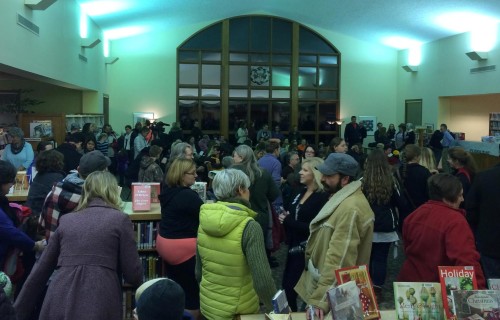
Mt. Horeb community reading of “I am Jazz”[Courtesy A. Bledsoe]
To end the conversation, we asked our interviewees what this day, Transgender Day of Remembrance means to them.
JB: In a world where some of us can’t get people to call us by our names and correct pronouns, and where people are invisible (or have to try to be to survive), the reading of people’s names feels entirely necessary; it is simultaneously a frail gesture and one that is revolutionary. Names are commonplace, and they are sacred. We have to call out the names of those who have been casualties of our oppressive and alienating systems. We have to set aside a week for Transgender Awareness, and a day to remember those who have died, so that cisnormativity and cisgender privilege aren’t all that there is, so that trans* folks see that we’re not alone, and so we remind ourselves to keep on working for a world where the numbers of the dead go down from one year to the next.
BB: For me its a very solemn day and has been. It reminds me of all the violence worldwide against our trans* community, more so in other countries. When I hear about the violent murders, beatings, and especially the suicides when a lot of us get so depressed especially when family and friends choose to not love us, or accept us a human beings. That’s where more education will help.
KL: The Transgender Day of Remembrance is a memorial to those we have lost, and it is a reminder of why we must always move forward. It is not only for ourselves that we seek safety and equality. It is in memory of those who came before, and it is for those who will come after. What is remembered, lives.
* * *
Rev. Katharine Luck will be holding a vigil and memorial in Pensacola, Florida through the organization STRIVE. Brianne Burne and Jake Bradley, along with co-coordinator Nick Metrick and Rev. Selena Fox, will be hosting observances in Wisconsin, through Circle Sanctuary.
Bradley noted, “I feel really honored to contribute to [Circle’s event] by helping to shine a light on those impacted by transphobic hate and violence this year, and by helping to celebrate the resilience of the TGNC community. I think events like this are sorely needed, especially at a moment in our national history that feels terrifying and bleak for so many of us, because they help us demonstrate and galvanize allyship.They remind us that some particulars of our stories may differ, but that all those of us who face oppression or marginalization have much in common.”
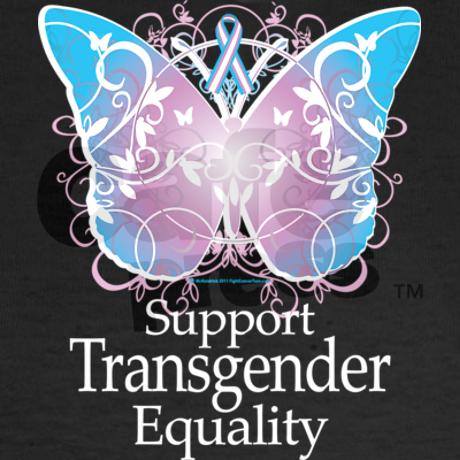
For those people who are attending organized vigils today or would like to participate in their own way privately or with their own groups, TWH has provided the TDoR list of 2016 victims of anti-transgender violence. There are many others resources on the issues discussed for both trans people and allies. GLAAD provides a short list of legal resources and other support. Now celebrating its second anniversary, the Trans Lifeline is available nationally.
The Wild Hunt is not responsible for links to external content.
To join a conversation on this post:
Visit our The Wild Hunt subreddit! Point your favorite browser to https://www.reddit.com/r/The_Wild_Hunt_News/, then click “JOIN”. Make sure to click the bell, too, to be notified of new articles posted to our subreddit.
Wonderful article and thank you for supporting trans people.